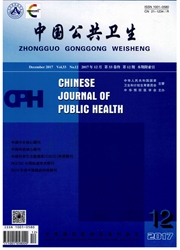

 中文摘要:
中文摘要:
目的了解江苏省南京市汉族居民胃癌发病的环境影响因素,为采取干预措施提供参考依据。方法采用1:1配对病例对照研究方法对2008年4月—2011年10月在东南大学附属中大医院、江苏省肿瘤医院、鼓楼医院等三甲医院收集的476例新发胃癌患者及同期就诊的476例非消化道系统非肿瘤疾病患者进行问卷调查。结果病例组消化系统疾病史、消化系统疾病家族史、肿瘤家族史、有毒有害物质接触史、吸烟、饮酒、喜食腌制食品、三餐不定时、暴饮暴食、喜食新鲜水果、喜食牛奶、喜食烟熏煎炸食品和精神压抑的比例分别为33.61%、18.07%、22.06%、22.48%、48.74%、71.01%、22.48%、20.17%、7.98%、59.03%、67.44%、22.06%和62.39%,对照组分别为19.12%、7.56%、8.19%、13.66%、40.13%、53.78%、7。77%、7.56%、1,68%、79.83%、81.72%、9.24%和19.54%,差异均有统计学意义(P〈0.05);多因素logistic回归分析结果表明,消化系统疾病史、肿瘤家族史、三餐不定时、喜食烟熏煎炸食品和精神压抑是南京市汉族居民胃癌发病的环境危险因素;喜食新鲜水果是南京市汉族居民胃癌发病的环境保护因素。结论消化系统疾病史、肿瘤家族史、三餐不定时、喜食烟熏煎炸食品、喜食新鲜水果和精神压抑是南京市汉族居民胃癌发病的环境影响因素。
 英文摘要:
英文摘要:
Objective To explore the environment risk factors of stomach cancer in Han population of Nanjing city. Methods Data of 476 new cases of gastric cancer and 476 controls were collected from April 2008 to October 2011 with a questionnaire survey. Potential risk factors were analyzed with logistic regression model and odds ratio (OR) and 95 % confidence interval(CI) were calculated. Results The ratios of history of digestive system disease, family history of digestive system disease, family history of tumor, the history of poisonous substances exposure, smoking, alcohol drink- ing, preference of taking pickled food, irregular diet habit, engorgement, high fresh fruit consumption, high milk consump- tion, high smoked and fried food consumption, and depression in case group were 33.61%, 18.07% ,22. 06% ,22. 48% , 48.74% ,71.01% ,22.48% ,20. 17%, 7.98%, 59.03%, 67.44%, 22. 06%, and 62. 39% and the ratios in the controls were 19. 12%, 7. 56%, 8. 19%, 13. 66%, 40. 13%, 53.78%, 7. 77%, 7. 56%, 1.68%, 79. 83%, 81.72%, 9. 24%, and 19. 54% ,respectively. The differences in the ratios between the case and control groups were statistically significant (P 〈 0. 05 for all). The multivariate logistic regression analyses showed that the history of digestive system disease, family tumor history,irregular diet habit,high smoked and fried food consumption,and depression were risk factors of gastric cancer. High fresh fruit consumption was a protective factor for stomach cancer. Conclusion The family history of digestive system disease, family tumor history, smoked and fried food consumption, irregular diet habit, depression, and high fresh fruit consump- tion were impact factors of gastric cancer in the Han residents of Nanjing.
 同期刊论文项目
同期刊论文项目
 同项目期刊论文
同项目期刊论文
 期刊信息
期刊信息
